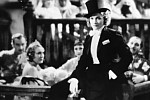 Shadows off the beaten path
Shadows off the beaten pathTHEN AND NOW | 2 MINUTES LATER
< < V I D E O S > >
last update 9.May.09
See also: SHADOWS FILM FESTIVAL
 R E V I E W B Y R I C H C L I N E
R E V I E W B Y R I C H C L I N E MUST
MUST  SEE
SEE
scr Armistead Maupin
narr Lily Tomlin
with Tony Curtis, Susan Sarandon, Tom Hanks, Whoopi Goldberg, Harvey Fierstein, Quentin Crisp, Gore Vidal, Armistead Maupin, Shirley MacLaine, Farley Granger, John Schlesinger, Arthur Laurents
 release US 15.Mar.96,
release US 15.Mar.96, UK 12.Jul.96
reissue 4.May.09 dvd
95/US 1h42
TORONTO FILM FEST SUNDANCE FILM FEST
 With a rich archive of clips and interviews, this entertaining doc has a lot to say about the portrayal of sexuality on screen today. And the issues the film raises apply to any minority group.
With a rich archive of clips and interviews, this entertaining doc has a lot to say about the portrayal of sexuality on screen today. And the issues the film raises apply to any minority group.
From the earliest moving pictures, which showed two men dancing together, films have featured homosexuality. But most scenes reflected stereotypes rather than real life. And these narrow, negative images have caused a lot of pain, from promoting homophobia to confusing gay children who long to see people they can identify with. But their only role models are preening sissies, slimy murderers or asexual sidekicks. And these cliches are no different than the step-n-fetchits of early 20th century cinema.
Epstein and Friedman take a lively journey through film history, from the raunchy days of the 1920s to the Catholic crack-down and 30 years of the Production Code, which deleted a wide range of thematic elements. Filmmakers were forced to get creative; Alfred Hitchcock led the subtextual charge, along with the likes of Michael Curtiz (Peter Lorre in Casablanca), Nicholas Ray (Sal Mineo in Rebel Without a Cause) and Gore Vidal (Laurence Olivier in Ben-Hur). Not to mention the ultimate irony of Rock Hudson continually trying to bed Doris Day by pretending to be gay.
The film highlights US censorship even as filmmakers in Europe grappled openly with these issues (such as 18961's Victim). But even when things opened up in late-60s America, cliches remained through homosexuals who were unhappy (The Children's Hour) or doomed (Advice and Consent). Despite some positive portrayals (like Boys in the Band or Cabaret), gay men were often portrayed as killers (Cruising) and actors were discouraged from playing them. And it wasn't until Philadelphia that a top star like Tom Hanks bucked the trend. But even he had to die on screen to win an Oscar.
Along the way, the interviewees make incredibly telling observations, such as how the word "faggot" is still liberally used as an insult, while no one would dare use "nigger" in the same way. And even now, stories that include sexuality themes are watered down for an audience who, as MacLaine observes, is always ahead of Hollywood in what they're ready for. The real shame is that filmmakers are afraid to reflect the true diversity of their own viewers.
This is a remarkably well-assembled doc with a wonderful range of on-screen interviews. Curtis' comments about Spartacus and Some Like it Hot are priceless (and there are more in the DVD extras, plus comments from Gus Van Sant, Gregg Araki, Kenneth Anger and an interview with Vito Russo, author of the source book). This astute, riveting secret history of Hollywood is essential for any film student. Or fan.
4.May.09
 R E V I E W B Y R I C H C L I N E
R E V I E W B Y R I C H C L I N E MUST
MUST  SEE with Then and Now 1981-2004
SEE with Then and Now 1981-2004
dir Rob Epstein, Jeffrey Friedman
scr Rob Epstein, Jeffrey Friedman, Cindy Ruskin
narr Dustin Hoffman
with Vito Russo, Sara Lewinstein David Mandell, Suzi Mandell, David Mandell Jr,Sallie Perryman, Tracy Torrey, Bobbi Campbell, Larry Kramer, Paul Fusco, Gary Bauer, Roger Lyons
 reissue 8.Jun.04 dvd,
reissue 8.Jun.04 dvd, UK 4.May.09 dvd
89/US HBO 1h19
BERLIN FILM FEST LONDON FILM FEST
THE TIMES OF HARVEY MILK (1984)
 As relevant as when it was made 20 years ago, this emotional documentary takes a deeply personal look at the impact of Aids on society. Intimate and often rather sombre, it's simply essential viewing.
As relevant as when it was made 20 years ago, this emotional documentary takes a deeply personal look at the impact of Aids on society. Intimate and often rather sombre, it's simply essential viewing.
The film centres on the stories of five people memorialised on the Aids quilt. Lewinstein tells of her daughter's doting father, Tom Waddell, an Olympic decathlon who spent his life fighting stereotypes and founded the Gay Games. Perryman talks about her husband Robert, a struggling ex-addict who becomes a terrific dad. Russo shares the story of his partner Jeffrey Sevcik, a bright young man who fought the disease with natural remedies. The Mandells remember their 12-year-old haemophiliac son David Jr, an outspoken boy who never gave in to his condition. And Torrey talks about the difficulty both he and his partner David Campbell had with the fact that they were gay.
Three of the storytellers also have Aids and, besides the wide variety of their experiences, the film's strongest comments centre on the grotesque injustice inflicted by the American government (and the public), which turned its back on people who were dying, even blaming them for disease. President Reagan refused to even speak the word "Aids". As a result, the numbers of patients multiplied exponentially (from 335 in 1981 to 55,388 in 1988) as people watched their loved ones die around them. America was the last Western nation to develop an Aids education programme, and it's still inadequate today. The problem, as one critic notes, is that the government acts as if its job is to save souls rather than lives.
The film also documents the quilt itself, begin by Cleve Jones in 1987 as a way to draw attention to the situation. By the time the quilt was displayed in Washington, it completely filled the Mall. Filmmakers Epstein and Friedman weave in remarkable photos, home movies and news clips of the five central figures, plus considerable historical footage and scenes in which officials openly express their ignorance, prejudice and homophobia (even at the time, they should have known better). This deeply moving film also offers a remarkable and important look at bereavement, as people discuss their experiences with honesty and raw emotion. And it ends on a positive note, looking at a time that's still in the future: someday humanity will look back and remember that there was such a thing as Aids. And that we've survived.
Then and Now 1981-2004
dir Rob Epstein, Jeffrey Friedman
with Cleve Jones, Marcus Conant, Selma Dritz
04/US 43m

 Epstein and Friedman follow up Common Threads 15 years later with this subtle two-part documentary (now a DVD extra). The first section, shot in 1988, features doctors Conant and Dritz talking about reports of this "new illness" in the early 1980s and how they realised it was something different: it wasn't an infectious disease, but rather a condition affecting the body's immune system. What's most telling here is that, even then, scientists knew a lot about Aids, including that research would have wider ramifications, most notably because Aids could have given researchers insight into the causes of cancer.
Epstein and Friedman follow up Common Threads 15 years later with this subtle two-part documentary (now a DVD extra). The first section, shot in 1988, features doctors Conant and Dritz talking about reports of this "new illness" in the early 1980s and how they realised it was something different: it wasn't an infectious disease, but rather a condition affecting the body's immune system. What's most telling here is that, even then, scientists knew a lot about Aids, including that research would have wider ramifications, most notably because Aids could have given researchers insight into the causes of cancer.
The second half centres on Jones, a colleague of Harvey Milk and creator of the Aids Memorial Quilt, speaks openly about his experiences back when the average lifespan of an Aids patient was seven months. It was simply inconceivable for him to watch these vital community members simply disappear around him. His raw anger at the general apathy is palpable, and we can understand why he conceived of the quilt as a way to shame politicians into seeing what they'd done through their inaction. It was never meant to be passive or sentimental. And he makes interesting observations about how things have changed now that having HIV isn't fatal, and how it's a disease that affects everyone regardless of race, sex, nationality or economic status. In other words, it was never a gay disease at all.
4.May.09
 R E V I E W B Y R I C H C L I N E
R E V I E W B Y R I C H C L I N E
with Michael Molina, Jessica Graham, Peter Stickles,
J Matthew Miller, Jennifer Layne Park, Joe Almanza, Mei-Yann Hwang, Grant Barker, Liz Douglas, Houston Bernard, Scott Spragg, Ben Sander
 release US 24.Jun.08 dvd,
release US 24.Jun.08 dvd, UK 27.Apr.09 dvd
07/US 1h08
 Clearly the pilot for a TV series padded out with a few montage sequences, this queer mystery has plenty to keep us interested, from snappy chemistry to an intriguingly twisty plot. But it never really goes anywhere.
Clearly the pilot for a TV series padded out with a few montage sequences, this queer mystery has plenty to keep us interested, from snappy chemistry to an intriguingly twisty plot. But it never really goes anywhere.
Michael (Molina) is an insurance investigator who drops in on his identical twin brother Kyle when he's in Philadelphia. No one has seen Kyle in weeks, but everyone mistakes Michael for his brother, so he adopts his identity and starts snooping around. Soon he runs into Abigail (Graham), a private eye also looking for Kyle, and their detective work reveals a string of enemies that Kyle made while aggressively photographing models in various states of undress. But as they get closer to the truth, they also get into some very dangerous situations.
The film lets both of the detectives narrate the story, noir-style, as the lonely gay man and flirtatious lesbian make an unlikely pair. Molina and Graham have a great spark on screen, and their encounters with Kyle's models give them a chance to indulge in some silly but funny situations. By contrast, Molina also plays the two-minutes-older Kyle, an aggressive, arrogant superstar who delights in humiliating the men and women he's photographing.
Instead of fleshing out the characters or the plot, writer-director Gaston spends extra time in flashbacks and naked photo collages which are eye-catching but don't really deepen the story. In addition to the enjoyable "beginning of a beautiful friendship" premise, one of the nicer side stories is Michael's relationship with Kyle's young assistant Joey (Miller). But key plot elements are completely left out of the film, while other storylines are snuffed out before they can properly begin.
It's a bit of a surprise when Gaston turns the previously light story in some extremely violent directions, complete with random murders, gun shootouts, car chases and a plot that echoes Antonioni's Blow Up. But none of this is done with much energy or authenticity, while the central mystery itself isn't actually pursued to its conclusion. And even with some solid performances, other actors get rather hammy. At least this adds more humour to the film, which in the end is just a bit of sexy fun.
25.Apr.09


If you have an film you want me to review - just ASK
© 2009 by Rich Cline, Shadows
on the Wall